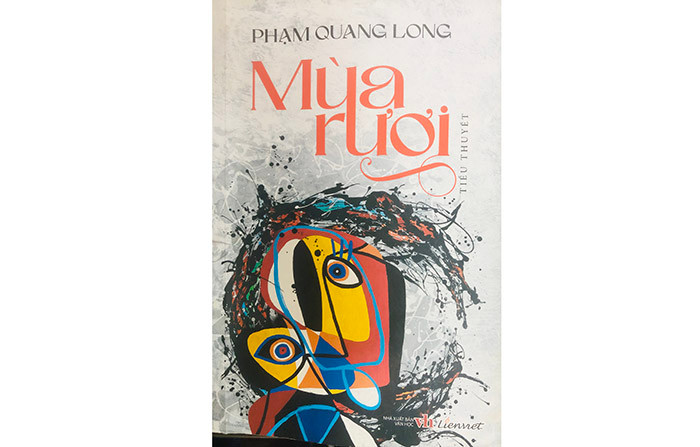The novel "Season of the Earthworms" by Pham Quang Long is not about earthworms but about people, his concerns about farmers' and rural life...

In the history of contemporary Vietnamese literature, there are many famous writers who wrote very well about the topic of agriculture and the countryside, leaving a strong impression such as: The distant time by Le Luu, Endless field by Nguyen Ngoc Tu, Silent in the deep abyss by Do Bich Thuy, Land of many people and many ghosts by Nguyen Khac Truong, Missing the countryside by Nguyen Huy Thiep...
Most of these excellent works have been adapted into films and broadcast on television, loved by audiences nationwide. Most recently, there is a teacher and cultural manager who is very passionate about the topic of agriculture and rural areas, Associate Professor, Dr. Pham Quang Long, former Principal of the University of Social Sciences and Humanities, who has just released to readers the novel "Season of the Worms" which has caused a stir in public opinion. Literary critic Pham Xuan Nguyen commented: "The novel "Season of the Worms" by Pham Quang Long is not about worms but about people, his concerns about the life of farmers and rural areas...".
The novel "Rươi Season" by writer Pham Quang Long with more than 430 pages divided into 23 chapters is very attractive to read right from the first pages. The writer tells the story of a village in the Northern Delta named Ha Dong, which is the author's hometown. That village is blessed by nature, every year there is a rươi season in the ninth and tenth lunar months "September 20th, October 5th". The whole village of Ha Dong lives in a state of fluttering hope, thanks to that special rươi, many families have escaped poverty, and also encouraged other families to know how to save money and do business, learn from each other's experiences to rise up and become rich.
In the novel, the author only builds about 20 characters, some of which are husband and wife, sometimes the whole family, or sometimes a character only appears once, but their inner personality and body language are consistent throughout the work, so that readers will remember them forever, such as the characters Dinh, the village chief, a veteran devoted to the village; old Hoan, a cunning, sly, autocratic, patriarchal farmer; and Tam, a young, talented, close-knit district chairman, who dares to take responsibility for his decisions in directing local socio-economic development...
The story of Ha Dong village is the story of farmers who work hard all year round, “selling their faces to the land and their backs to the sky”. They believe in the Party’s guidelines and policies in developing agriculture and rural areas, accompanying the revival of “three farmers” in the cause of industrialization and modernization of the country in the early years of the 21st century…
The novel "Rươi Season" has raised many hot current issues of agriculture, rural areas and farmers. That is the issue of output for agricultural products of farmers such as the story of the whole village rushing to grow ginseng, in the end only getting a few jars of wine. Or the mentality of small farmers, afraid of contact with new things, in the story of raising rươi. With the same land, some families earn hundreds of millions, many families are left empty-handed... The issue of building new rural areas is the author's concern through the gains and losses from reality. Through the confidences of an active character in the novel: "Building new rural areas, modernizing rural areas, agriculture is the leading front... that's right. But which is right, which is wrong, how wrong is right, have you thought carefully? As for other things, valuing money too much has ruined too many things. The worst thing is the village relationship now... If modernization ruins people, then I don't want modernization at all?".
The writer also felt a deep sorrow when the life of farmers improved, the countryside was also deeply affected by the market mechanism, traditional customs were gradually lost and bad things were competing to destroy, making the village and neighborly relationship fade away. That was when the virtual land fever crept into the poor countryside, greedy farmers competed to sell land, fill in ponds to build houses, creating "Tan street" with drinking places, karaoke with loud music... attracting many young people, farmers neglected their fields, gathered to have fun, giving rise to theft, making the countryside unable to be peaceful...
The author also worries when mentioning the urgent issue in the Party's work today. That is the degeneration and corruption of a large number of cadres and Party members in the vortex of the market mechanism.
As a writer born and raised in the countryside, attached to his homeland, author Pham Quang Long has painted a wonderful picture of the countryside. In the novel, he praises the gentle, uneducated, hard-working, but honest and simple farmers. The picture of the countryside in the novel is not so gloomy and deadlocked. The Dong Ruoi project manipulated by interest groups has been punished by law, the soul of the village is the communal house, the banyan tree with the specialty dish of cooked Ruoi, fragrant braised Ruoi that "deafens" the noses of the neighbors, still in the memories of those who are far from home. The novel ends with the wedding of a gentle couple, Hien and Thao, who are loved by the villagers.
With a very vivid narrative language, writer Pham Quang Long skillfully conveyed very rustic words and speech into dialogues, creatively applying and using idioms, proverbs, and folk songs to describe the mood, behavior, and living habits of farmers, making the text more engaging.
The novel "Season of the Earthworms" is the writer's 5th novel collection.
Writer Pham Quang Long's contributions to the country's literature are truly valuable, especially on the topics of agriculture and rural areas...
NGUYEN VIET HIEN